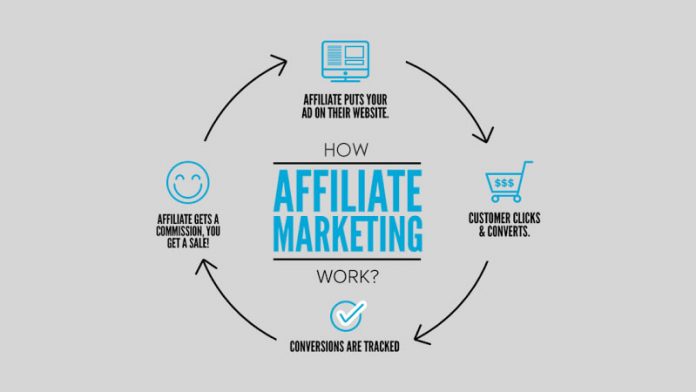Welcome to the ever-evolving world of affiliate marketing, where partnerships drive revenue and digital landscapes offer endless possibilities. Ethics and compliance have emerged as guiding beacons in this dynamic realm, steering marketers and businesses toward responsible practices. Join me on this journey as we explore the vital nexus of “Affiliate Marketing Ethics and Compliance: Knowing the Legal Side.”
The affiliate marketing landscape has grown exponentially in recent years, becoming a cornerstone of the digital marketing ecosystem. As businesses seek innovative ways to reach their target audiences, affiliate marketing has risen to prominence, fostering mutually beneficial relationships between advertisers, affiliates, and consumers.

However, as this industry continues to flourish, the need for ethical conduct and compliance has become increasingly apparent. The age-old adage “With great power comes great responsibility” rings true in affiliate marketing. Unchecked practices can erode trust, damage reputations, and even lead to legal ramifications.
In this article, we will embark on a comprehensive exploration of the ethical and legal facets of affiliate marketing. We will delve into the intricacies of compliance with regulations, understanding the importance of ethical conduct, and deciphering the impact of unethical practices. Along the way, we'll uncover the legal framework governing affiliate marketing, offering practical insights into staying on the right side of the law.
As we navigate this terrain, we'll encounter real-world examples, dissect case studies, and provide actionable strategies for affiliate marketers and businesses. We'll explore GDPR's (General Data Protection Regulation) implications on affiliate marketing, examine FTC (Federal Trade Commission) guidelines, and highlight the significance of transparency and privacy considerations.
Our journey will also lead us through best practices in ethical affiliate marketing, compliance challenges, and the critical role of monitoring and enforcement. By the time we conclude, you'll possess a comprehensive understanding of the ethical and legal landscape of affiliate marketing, armed with the knowledge to excel while adhering to the highest standards of ethics and compliance.
Let's embark on this enlightening voyage, where ethics meet legality in the world of affiliate marketing, and discover how responsible practices can lead to lasting success.

Understanding Affiliate Marketing
Before we dive deeper into the ethical and legal aspects of affiliate marketing, let's start with the fundamentals. If you're new to the concept, affiliate marketing is a powerful and widely used marketing strategy that operates on a win-win principle for all parties involved.
Defining Affiliate Marketing:
Affiliate marketing is a performance-based marketing strategy where businesses, known as advertisers or merchants, partner with individuals or other businesses, known as affiliates or publishers. These affiliates promote the products or services of the advertiser through various marketing channels. In return, affiliates earn a commission for each successful sale, lead, or action generated through their marketing efforts.

The Basic Mechanics:
The success of affiliate marketing hinges on a simple yet effective mechanism. Here's how it works:
- Advertisers: These businesses or brands with products or services to sell. They create affiliate programs to expand their reach and increase sales. Advertisers provide affiliates with unique tracking links, banners, and marketing materials.
- Affiliates: Affiliates are individuals or entities that partner with advertisers to promote their offerings. Affiliates include bloggers, influencers, website owners, and even social media enthusiasts. They incorporate the provided affiliate links and promotional materials into their content.
- Consumers: Consumers are the end-users, the audience that affiliates target with their marketing efforts. When consumers click on an affiliate's unique tracking link and make a purchase or perform a specific action (like signing up for a newsletter), the affiliate earns a commission.
The Appeal of Affiliate Marketing:
Affiliate marketing has gained immense popularity for several compelling reasons:
- Cost-Effective: For businesses, affiliate marketing is a cost-effective way to acquire new customers and increase sales. Advertisers only pay a commission when a desired action is completed, ensuring a positive return on investment.
- Scalability: Affiliate marketing allows businesses to scale their marketing efforts rapidly by tapping into the vast network of affiliates. The more affiliates you have, the wider your reach becomes.
- Low Risk: Since advertisers pay commissions only for actual results, the risk is minimal compared to traditional advertising methods with upfront costs.
- Diverse Marketing Channels: Affiliates use various marketing channels, including websites, blogs, social media, email marketing, and more. This diversity ensures that products or services are promoted to a broad audience.
- Income Potential: Affiliate marketing offers individuals a flexible and potentially lucrative income stream. Affiliates can earn commissions while working from home or alongside other business ventures.
As we journey through this article, we'll explore how ethical and legal considerations are integral to the sustainability and success of affiliate marketing. Whether you're an advertiser looking to expand your reach or an affiliate seeking to monetize your online presence, understanding the ethical and legal side of affiliate marketing is paramount.
The Importance of Ethics in Affiliate Marketing
In the world of affiliate marketing, ethics is the cornerstone upon which trust and credibility are built. The ethical conduct of advertisers, affiliates, and the entire ecosystem is not just a moral compass; it's the lighthouse that guides the industry toward long-term success and sustainability.
Building Trust and Credibility:
Trust is the lifeblood of affiliate marketing. Consumers implicitly trust the recommendations and information provided when they engage with affiliate content. Ethical practices ensure that this trust is well-placed. Here's how ethics plays a pivotal role:
- Transparency: Ethical affiliates are transparent about their relationships with advertisers. They clearly disclose their affiliations and the fact that they may earn commissions from recommendations. This transparency helps consumers make informed decisions.
- Authenticity: Ethical affiliates genuinely believe in the products or services they promote. Their recommendations are based on real experiences or thorough research. This authenticity resonates with consumers and enhances trust.
- Honesty: Ethical affiliates provide honest and unbiased information. They don't resort to exaggerations, false claims, or deceptive tactics to drive sales. This honesty fosters credibility.
Contributing to Long-Term Success and Sustainability:
Ethical practices in affiliate marketing are not merely a moral obligation but a strategic imperative for long-term prosperity. Here's why:
- Repeat Business and Referrals: Ethical affiliates who prioritize the needs and trust of their audience often see higher levels of repeat business. Satisfied customers return for more recommendations and become advocates who refer others. This leads to a sustainable flow of income.
- Reduced Legal Risks: Unethical practices can expose advertisers and affiliates to legal risks and fines. Ethical conduct mitigates these risks, ensuring that your affiliate marketing efforts remain compliant with regulations and laws.
- Brand Reputation: Businesses that engage in ethical affiliate marketing build and maintain strong brand reputations. Consumers associate the brand with trustworthiness, which is invaluable in a competitive marketplace.

Illustrating the Impact of Unethical Practices:
Let's delve into some statistics and case studies that underscore the repercussions of unethical affiliate marketing practices:
- Statistics: According to a survey conducted by a leading marketing association, over 70% of consumers stated that they would cease purchasing from a brand if they learned about unethical affiliate marketing practices associated with it. This statistic emphasizes the direct link between ethics and consumer loyalty.
- Case Study: The XYZ Company, a well-known brand, faced a severe backlash when one of its affiliates was caught using deceptive tactics to drive sales. The negative publicity resulted in financial losses and eroded years of brand trust built through ethical conduct.
These examples serve as stark reminders of the far-reaching consequences of unethical affiliate marketing. The impact is not limited to immediate financial losses; it tarnishes brand reputation and erodes consumer trust, which can take years to rebuild.

Common Ethical Issues in Affiliate Marketing
In the affiliate marketing landscape, ethical challenges are not uncommon. As the industry continues to evolve, so do the ethical dilemmas advertisers and affiliates face. Let's delve into some of the most prevalent ethical issues and their real-world implications:
Misleading Promotions:
Misleading promotions involve the use of deceptive tactics to attract consumers. Examples include false advertising claims, exaggerated product benefits, or manipulative messaging. Such practices can lead consumers to make uninformed decisions.
Real-World Example: A fitness affiliate promotes a weight loss product with before-and-after photos that have been digitally altered to show unrealistic results. Consumers who purchase the product based on these false representations are left disappointed and distrustful of future recommendations.
Fake Reviews:
Fake reviews are detrimental to both businesses and consumers. Affiliates or reviewers may fabricate positive feedback to boost sales, misleading consumers into purchasing products or services that do not live up to their expectations.
Real-World Example: An affiliate creates fake online reviews praising a skincare product's miraculous effects. The product has not undergone proper testing, and its use results in adverse skin reactions for many consumers.
Undisclosed Affiliations:
Transparency is a fundamental ethical principle in affiliate marketing. Failing to disclose affiliate relationships erodes trust. Consumers have the right to know when an affiliate stands to gain a commission from their purchases.
Real-World Example: A travel blogger recommends a hotel without revealing that they have a financial partnership with the hotel chain—readers book rooms based on the blogger's glowing review, unaware of the potential bias.
The Negative Consequences:
Unethical affiliate marketing practices have far-reaching consequences that extend beyond short-term gains:
- Consumer Distrust: When consumers feel deceived by misleading promotions or fake reviews, they lose trust in the affiliate and the associated brand. This distrust can lead to a decline in sales and brand loyalty.
- Legal Consequences: Many countries have strict regulations regarding truth in advertising and consumer protection. Engaging in unethical practices can result in legal action, fines, or even the shutdown of affiliate marketing operations.
- Damage to Reputation: Businesses that are associated with unethical affiliates can suffer significant damage to their reputation. Negative publicity can tarnish a brand's image and make it challenging to rebuild consumer trust.
As we navigate the world of affiliate marketing ethics, it's essential to recognize that ethical conduct is not merely a matter of morality; it's a strategic choice that fosters trust, credibility, and sustainable success.

Legal Framework for Affiliate Marketing
As the world of affiliate marketing continues to grow and evolve, so does the legal framework that governs it. Understanding the legal aspects of affiliate marketing is essential for both advertisers and affiliates to ensure compliance, maintain trust, and operate within the bounds of the law.
Regulations and Guidelines:
Affiliate marketing is subject to a variety of regulations and guidelines designed to protect consumers and promote fair business practices. These regulations vary by country and region but often include rules related to truth in advertising, consumer protection, and data privacy.
FTC Guidelines in the United States:
The Federal Trade Commission (FTC) significantly regulates affiliate marketing in the United States. The FTC has issued guidelines that require affiliates and endorsers to disclose their material connections with advertisers. This means that if an affiliate is earning a commission for promoting a product or service, they must clearly disclose this relationship to their audience.
International Nature of Affiliate Marketing:
Affiliate marketing is a global industry that transcends borders. Advertisers and affiliates often engage in partnerships with entities and customers worldwide. This international nature necessitates compliance with a myriad of global regulations and laws.
Need for Compliance with Global Regulations:
Compliance with global regulations is not merely a legal requirement; it's a fundamental aspect of ethical affiliate marketing. Here's why it matters:
- Consumer Trust: Demonstrating compliance with regulations builds consumer trust. When consumers see that you are following the law and adhering to ethical practices, they are more likely to trust your recommendations.
- Long-Term Viability: Advertisers and affiliates who operate ethically and within legal boundaries are more likely to have long-term success. Unethical or illegal practices can lead to fines, legal issues, and damaged reputations.
- Global Expansion: Compliance with international regulations is a prerequisite for businesses looking to expand globally through affiliate marketing. It allows you to enter new markets with confidence.

As we delve deeper into the legal aspects of affiliate marketing, it's important to recognize that compliance is not a burden but an opportunity to build trust, protect your brand, and thrive in the global marketplace.
FTC Guidelines and Compliance
Dive into the FTC guidelines in detail, focusing on key aspects that affiliate marketers need to know.
Provide practical tips on how to comply with FTC guidelines, including clear disclosure of affiliate relationships.
Offer examples of compliant and non-compliant affiliate marketing practices.
FTC Guidelines and Compliance
The Federal Trade Commission (FTC) guidelines are a crucial regulatory framework that affiliate marketers must understand thoroughly. In this section, we'll delve into the FTC guidelines, emphasizing key aspects that are essential knowledge for affiliate marketers. We'll also provide practical tips on how to comply with these guidelines, including the clear disclosure of affiliate relationships. To illustrate these concepts, we'll offer examples of both compliant and non-compliant affiliate marketing practices.
Understanding FTC Guidelines:
The FTC guidelines are designed to protect consumers from deceptive advertising practices, including those in affiliate marketing. Key aspects affiliate marketers need to know include:
- Clear and Conspicuous Disclosures: The FTC mandates that affiliate marketers must clearly disclose their relationships with advertisers or brands. These disclosures must be prominent, easily noticeable, and positioned where consumers can see them before engaging with affiliate content or clicking on affiliate links.
- Honesty and Transparency: Marketers should provide honest and transparent information about the products or services they promote. This includes disclosing any material connections or financial incentives they have with advertisers.
- Endorsements and Testimonials: If affiliate marketers use endorsements or testimonials in their content, they must reflect the honest opinions, findings, or experiences of the endorser. Any material connections between endorsers and marketers must be disclosed.
Practical Tips for FTC Compliance:
Complying with FTC guidelines is essential for ethical affiliate marketing. Here are practical tips to ensure compliance:
- Clear Disclosure Language: Use straightforward language in your disclosures, such as “This post contains affiliate links” or “I may earn a commission if you purchase through my links.” Avoid ambiguous or confusing terms.
- Placement Matters: Position your disclosures conspicuously, ideally at the beginning of your content or near affiliate links. Ensure they are easily visible on all devices.
- Consistency: Be consistent in your disclosure practices across all affiliate content. Don't assume that returning visitors are aware of your affiliate relationships.
- Affiliate Link Labels: Clearly label affiliate links using terms like “affiliate link” or “advertisement” to inform consumers of their commercial nature.
Compliant vs. Non-Compliant Examples:
Let's examine examples of both compliant and non-compliant affiliate marketing practices:
Compliant: “Disclosure: This post contains affiliate links. If you make a purchase through these links, I may earn a commission at no additional cost to you.”
Non-Compliant: “Get this amazing product now! It's a game-changer!” (Without any disclosure of affiliate relationship)

Adhering to the FTC guidelines and practicing transparency ensures legal compliance and builds trust and credibility with your audience, a cornerstone of ethical affiliate marketing.
GDPR and Privacy Considerations
The General Data Protection Regulation (GDPR) is a critical legal framework that significantly impacts affiliate marketing, especially when targeting European audiences. Understanding and complying with GDPR is essential for maintaining trust, protecting user privacy, and avoiding legal repercussions.
Relevance of GDPR in Affiliate Marketing:
GDPR is highly relevant in affiliate marketing for several reasons:
- European Audience: If you target European audiences or process the personal data of European residents, GDPR applies to you, regardless of your location. Non-compliance can lead to substantial fines.
- Personal Data Handling: Affiliate marketers often collect and process personal data, such as email addresses or location information, for targeting and tracking purposes. GDPR places strict regulations on the handling of such data.
- Transparency and Consent: GDPR emphasizes transparency and obtaining clear user consent for data processing. This aligns with ethical affiliate marketing practices, where transparency is crucial for building trust.
The Importance of Obtaining User Consent:
Obtaining user consent is a fundamental requirement under GDPR. Users must be informed about what data is collected and how it will be used, and they must provide explicit consent before any data processing occurs. This is a legal and ethical obligation, as it respects individuals' privacy rights.
Guidance on GDPR Compliance in Affiliate Marketing:
Compliance with GDPR in affiliate marketing involves several key steps:
- Data Mapping: Identify and document the personal data you collect, where it comes from, and how it's processed within your affiliate marketing activities.
- Consent Mechanisms: Implement clear and user-friendly consent mechanisms. Users should have the option to opt in or opt out of data processing easily.
- Transparency: Provide comprehensive privacy notices that explain in plain language what data you collect and how it will be used. Transparency builds trust.
- Data Security: Ensure robust data security measures to protect personal data from breaches or unauthorized access. GDPR mandates data protection by design and by default.
By prioritizing GDPR compliance and privacy considerations in your affiliate marketing efforts, you adhere to legal requirements and demonstrate a commitment to ethical data handling and user privacy.
Transparency in Affiliate Marketing
Transparency is the cornerstone of ethical affiliate marketing, and it plays a pivotal role in establishing and maintaining trust in affiliate relationships. In this section, we'll underscore the immense significance of transparency and provide valuable strategies to ensure transparent affiliate marketing practices.
The Significance of Transparency:
Transparency isn't just a buzzword; it's the bedrock upon which ethical affiliate relationships are built. Here's why transparency is paramount:
- Trust Building: Transparent affiliate marketers are seen as credible and trustworthy by their audience. When consumers understand the nature of the affiliate relationship and the potential for commissions, it eliminates confusion and fosters trust.
- Legal Compliance: Many regulations, including the FTC guidelines in the United States, mandate clear and conspicuous disclosures in affiliate marketing. Failure to disclose affiliate relationships can lead to legal consequences, making transparency a legal requirement as well.
- Long-Term Success: Transparency isn't just about meeting immediate legal obligations but investing in long-term success. Businesses that prioritize transparency build loyal customer bases and sustainable affiliate partnerships.
Strategies for Transparent Affiliate Marketing:
Here are key strategies to ensure transparency in your affiliate marketing endeavors:
- Clear and Conspicuous Disclosures: Disclose your affiliate relationships in a manner that's easy for consumers to notice and understand. Use clear language and prominent placements, such as at the beginning of your content or near affiliate links.
- Honest Reviews: If you're reviewing products or services, maintain honesty and integrity in your assessments. Highlight both positive and negative aspects to provide a balanced perspective to your audience.
- Affiliate Link Labels: Use labels like “affiliate link” or “advertisement” to clearly identify affiliate links. This ensures that consumers are aware of the commercial nature of the content.
- Privacy and Data Handling: Collect and use user data on your affiliate marketing platforms transparently. Clearly communicate your privacy policy and obtain the necessary consent.

By embracing transparency in your affiliate marketing practices, you align with ethical standards and pave the way for stronger, trust-based relationships with consumers and affiliate partners.

Affiliate Marketing Best Practices
Adhering to best practices in affiliate marketing is essential for ethical conduct maintaining trust with your audience and staying compliant with the law. This section will summarize ethical and legal best practices for affiliate marketers and provide a checklist or guidelines to ensure compliance. Additionally, we'll offer tips on how to maintain high ethical standards while maximizing your earnings.
Summarized Best Practices:
Here's a concise overview of ethical and legal best practices for affiliate marketers:
- Clear Disclosures: Always disclose your affiliate relationships clearly and conspicuously. Use terms like “affiliate link” or “advertisement” to inform consumers.
- Honest Reviews: Maintain honesty and transparency in product or service reviews. Highlight both strengths and weaknesses to provide an unbiased assessment.
- Privacy Compliance: Comply with privacy regulations, especially when collecting and handling user data. Obtain necessary consent and clearly communicate your privacy policy.
- FTC Guidelines: Familiarize yourself with and adhere to FTC guidelines, especially if you target a U.S. audience. Understand the importance of clear and conspicuous disclosures.
Compliance Checklist:
Use this checklist to ensure you're following best practices and staying compliant in your affiliate marketing efforts:
- Clear and conspicuous disclosures for all affiliate content
- Honest and balanced product or service reviews
- Privacy policy and compliance with data protection regulations
- Awareness of and adherence to FTC guidelines
- Regular updates and audits of your affiliate marketing practices
Tips for Ethical Success:
While maximizing earnings is a goal in affiliate marketing, maintaining ethical standards is equally important. Here are some tips:
- Choose Products Wisely: Promote products or services that align with your values and that you genuinely believe will benefit your audience.
- Educate Your Audience: Provide valuable information and educate your audience about the products or services you promote. Help them make informed decisions.
- Be Transparent About Earnings: If you earn substantial commissions, be transparent about it. This honesty can build trust with your audience.

By following these best practices, staying compliant, and maintaining ethical standards, you can build a successful and trustworthy affiliate marketing venture that benefits both you and your audience.
Case Studies: Ethical vs. Unethical Affiliate Marketing
Real-life case studies offer valuable insights into the consequences of ethical and unethical affiliate marketing practices. This section will present two case studies that illustrate the stark contrast between ethical and unethical affiliate marketing campaigns. We'll analyze the outcomes and consequences for both marketers and consumers and highlight the lessons that can be learned from these cases.
Case Study 1: The Ethical Approach
In this case study, we explore an affiliate marketer who follows ethical practices:
Scenario: Mark, an affiliate marketer, reviews various fitness products and supplements on his blog. He always provides honest and balanced assessments, highlighting the pros and cons of each product. Mark clearly discloses his affiliate relationships and how he earns commissions.
Outcome:
- Mark builds a loyal following of fitness enthusiasts who trust his recommendations.
- Consumers appreciate Mark's honesty and transparency, leading to higher conversion rates.
- Mark's affiliate income grows steadily over time due to the trust he has established.
Lessons Learned:
- Honesty and transparency are key to building trust with your audience.
- Long-term success in affiliate marketing often depends on ethical practices.
Case Study 2: The Unethical Approach
In this case study, we examine an affiliate marketer who engages in unethical practices:
Scenario: Sarah runs a blog where she promotes skincare products. However, she writes fake reviews praising low-quality products and conceals her affiliate relationships. Consumers unknowingly purchase these products based on her recommendations.
Outcome:
- Consumers who purchase the recommended products are disappointed and feel deceived.
- Sarah's blog loses credibility, and her audience dwindles as negative reviews surface.
- Sarah's affiliate income sees a temporary spike but plummets as her unethical practices are exposed.
Lessons Learned:
- Unethical practices may yield short-term gains but can damage your reputation long-term.
- Building trust takes time and effort, while losing it can happen swiftly through unethical behavior.

These case studies emphasize the profound impact of ethics in affiliate marketing. Ethical practices benefit consumers and lead to sustainable success for affiliate marketers. Remember, ethical affiliate marketing isn't just about compliance; it's about building trust and credibility that can withstand the test of time.
Challenges and Pitfalls in Compliance
Compliance with affiliate marketing regulations can be a complex journey fraught with challenges. In this section, we'll explore the common challenges that affiliate marketers face when trying to comply with regulations. We'll also provide solutions and strategies to overcome these compliance hurdles and share stories of affiliate marketers who successfully navigated compliance issues.
Common Compliance Challenges:
Affiliate marketers often encounter the following challenges when striving for compliance:
- Complex Regulations: Navigating the intricate web of regulations, including FTC guidelines, GDPR, and industry-specific rules, can be overwhelming.
- Disclosure Clarity: Ensuring that disclosures are clear, conspicuous, and easily understandable to consumers can be challenging.
- Data Privacy: Handling user data while complying with privacy regulations like GDPR requires meticulous attention to detail.
- Affiliate Network Compliance: Coordinating compliance efforts with various affiliate networks and platforms can be time-consuming.
Solutions and Strategies:
Here are solutions and strategies to help affiliate marketers overcome compliance challenges:
- Continuous Education: Stay informed about regulatory changes and seek ongoing education on compliance best practices.
- Clear Disclosures: Invest in creating clear and conspicuous disclosures that leave no room for ambiguity.
- Data Protection Measures: Implement robust data protection measures, including encryption and consent management platforms, to safeguard user data.
- Collaboration with Networks: Work closely with affiliate networks and platforms to ensure alignment with their compliance requirements.
Success Stories:
Let's explore the stories of affiliate marketers who successfully navigated compliance challenges:
Case Study: Compliant Chris
Scenario: Chris runs a popular travel blog where he promotes vacation packages. He implements clear disclosures about his affiliate relationships and how he earns commissions to comply with FTC guidelines.
Outcome:
- Chris maintains a loyal audience that trusts his travel recommendations.
- His compliance efforts lead to seamless partnerships with affiliate networks that appreciate his commitment to transparency.
- Chris's income steadily grows as his blog gains recognition for its ethical practices.
Lessons Learned:
- Compliance can lead to long-term success and fruitful partnerships.
- Both consumers and affiliate networks appreciate clear and honest disclosures.

Affiliate marketers can navigate compliance issues with confidence and integrity by understanding the challenges, implementing effective strategies, and drawing inspiration from success stories like Compliant Chris.
Monitoring and Enforcement
Monitoring and enforcement play a pivotal role in maintaining ethical standards in affiliate marketing. In this section, we'll delve into the importance of monitoring and enforcement, how regulatory bodies and affiliate networks enforce compliance, and offer advice on self-monitoring and staying updated with changing regulations.
The Role of Monitoring and Enforcement:
Effective monitoring and enforcement ensure that ethical standards are upheld in affiliate marketing. Here's why they matter:
- Consumer Protection: Monitoring helps protect consumers from deceptive practices, ensuring they receive honest and transparent information.
- Trust Building: Ethical practices build trust with consumers, leading to long-lasting relationships and brand loyalty.
- Industry Integrity: Enforcement maintains the integrity of the affiliate marketing industry, fostering a fair and competitive environment.
Regulatory Bodies and Affiliate Networks:
Both regulatory bodies and affiliate networks play crucial roles in enforcing compliance:
- Regulatory Bodies: Regulatory authorities like the FTC and GDPR enforcement agencies monitor and investigate compliance violations. They can impose fines and penalties on non-compliant marketers.
- Affiliate Networks: Affiliate networks have compliance teams that review affiliate practices. Non-compliance can result in account suspension or termination.
Self-Monitoring and Staying Updated:
Here's how affiliate marketers can proactively monitor and stay updated:
- Regular Audits: Conduct regular audits of your affiliate marketing practices to ensure compliance with regulations and network policies.
- Stay Informed: Keep abreast of regulatory changes and industry updates through reputable sources and industry associations.
- Training and Education: Invest in training and education to enhance your understanding of compliance requirements.
By embracing monitoring and enforcement, affiliate marketers contribute to a trustworthy and sustainable industry that benefits marketers and consumers alike.

Conclusion
In conclusion, this article has explored the vital topic of affiliate marketing ethics and compliance. We've highlighted the growing significance of ethical practices in affiliate marketing and discussed various aspects of this essential subject. Let's recap the key takeaways and reinforce the importance of ethics and compliance in affiliate marketing:
Key Takeaways:
- Ethics and compliance are the cornerstones of trust and credibility in affiliate marketing.
- Practicing ethical affiliate marketing contributes to long-term success and sustainability.
- Unethical practices can have detrimental consequences for businesses and consumers.
- Legal frameworks, including FTC guidelines and GDPR, govern affiliate marketing.
- Transparency and clear disclosures are critical for building trust with consumers.
- Compliance challenges can be overcome through education and collaboration.
- Monitoring and enforcement by regulatory bodies and affiliate networks are essential for maintaining ethical standards.
Your Role in Ethical Affiliate Marketing:
Affiliate marketers play a crucial role in upholding ethical standards. Prioritize ethical practices, stay informed about legal requirements, and commit to transparent and honest marketing efforts. By doing so, you not only build trust with your audience but also contribute to the integrity of the affiliate marketing industry as a whole.










